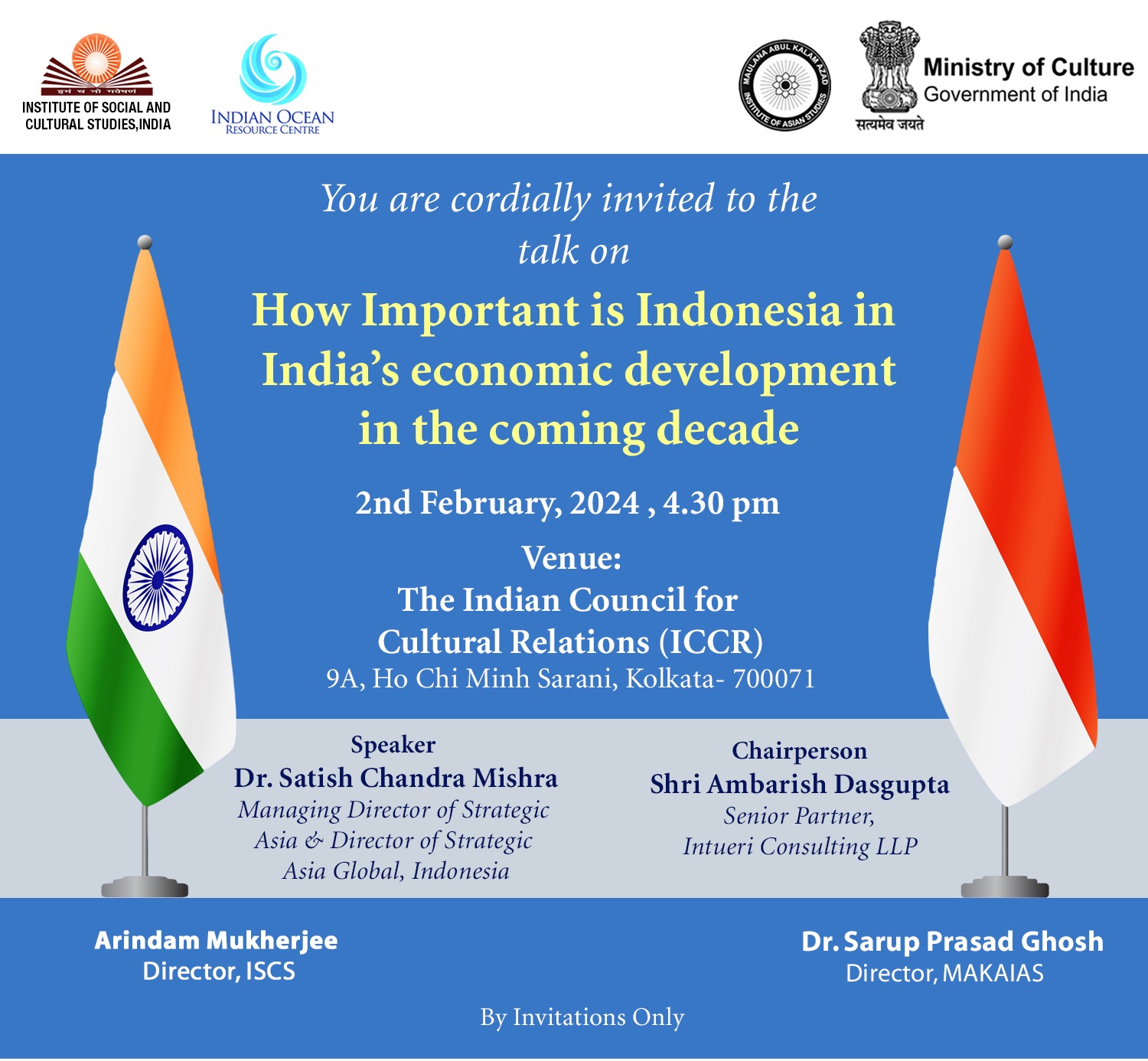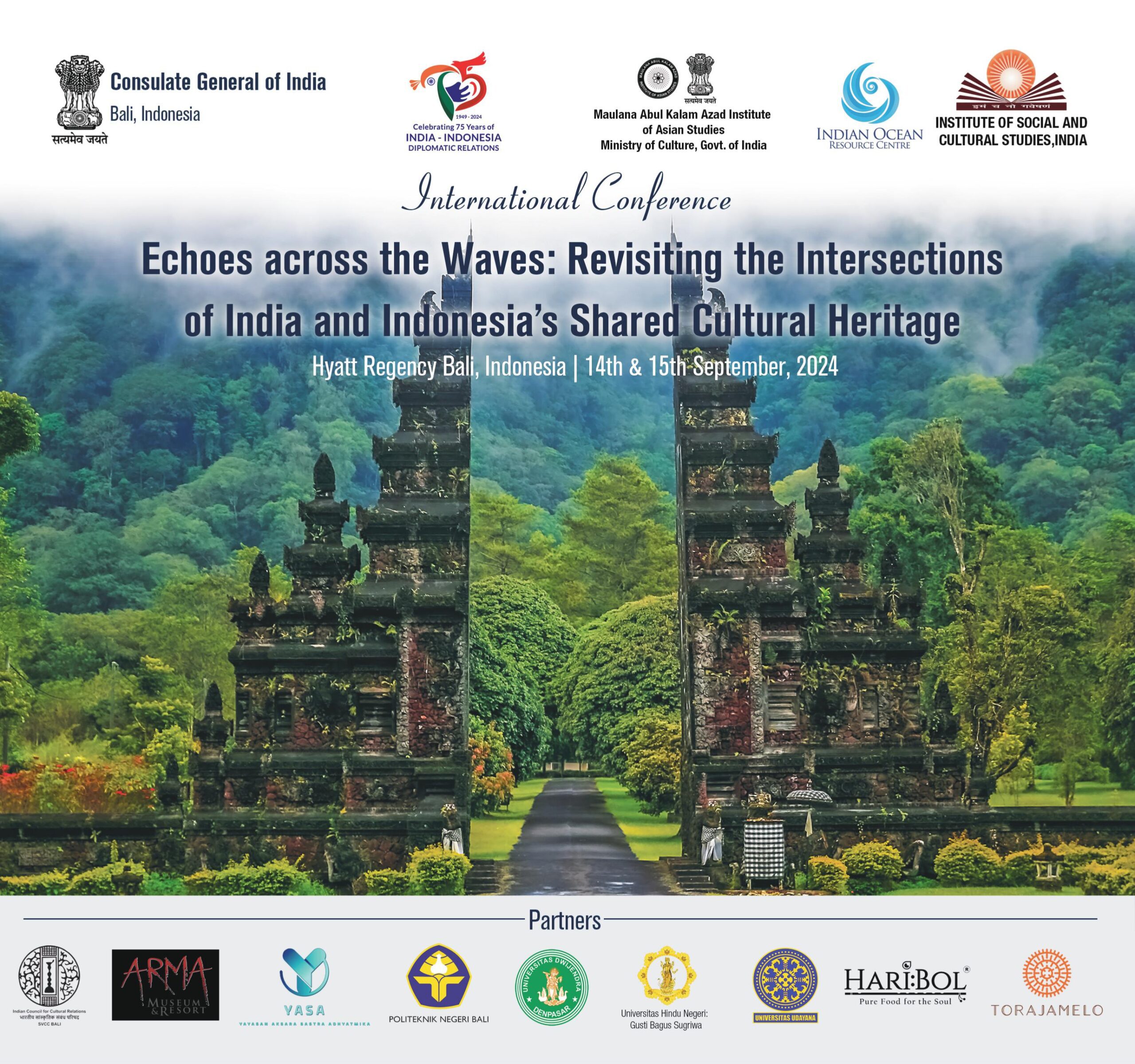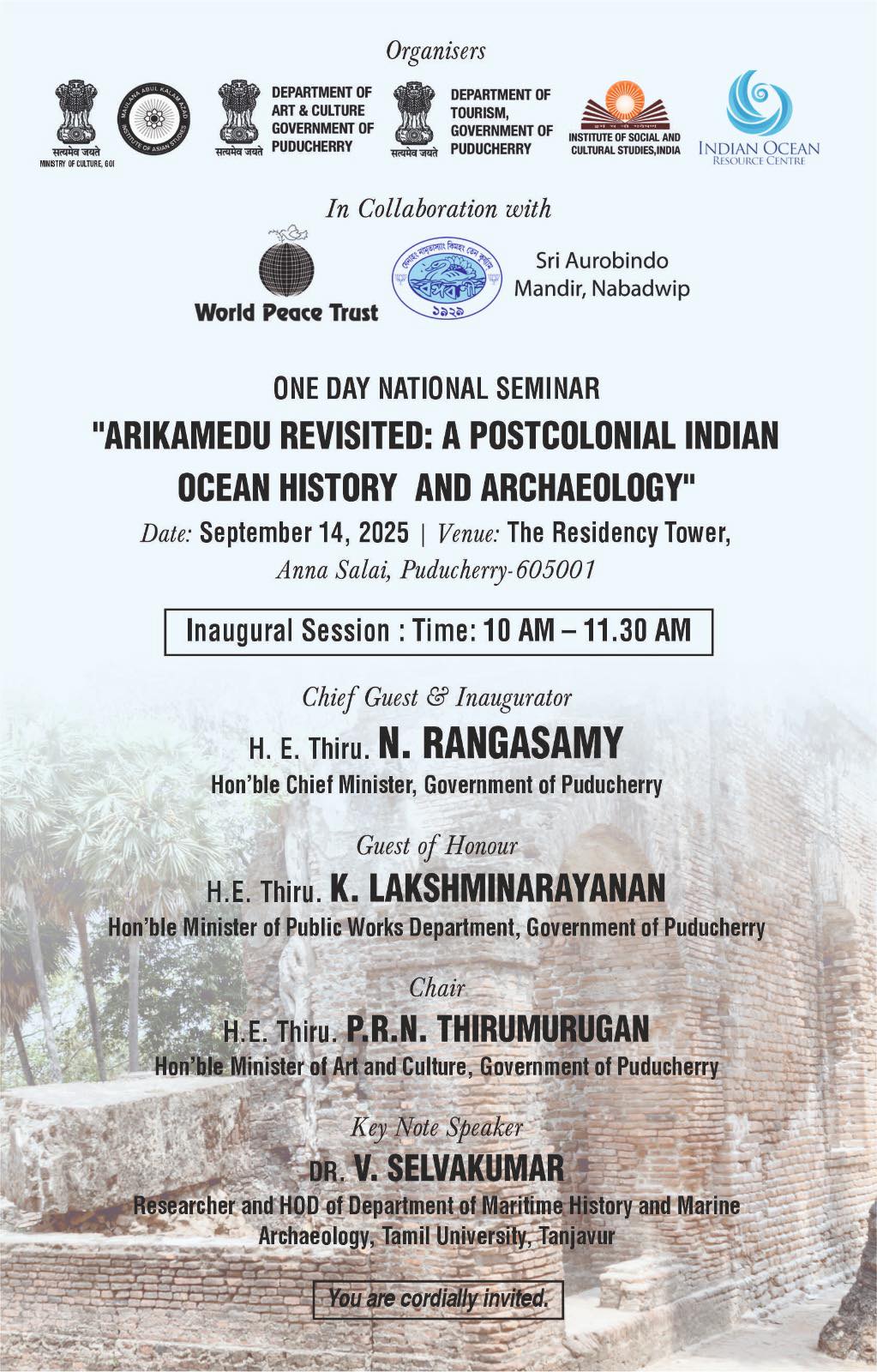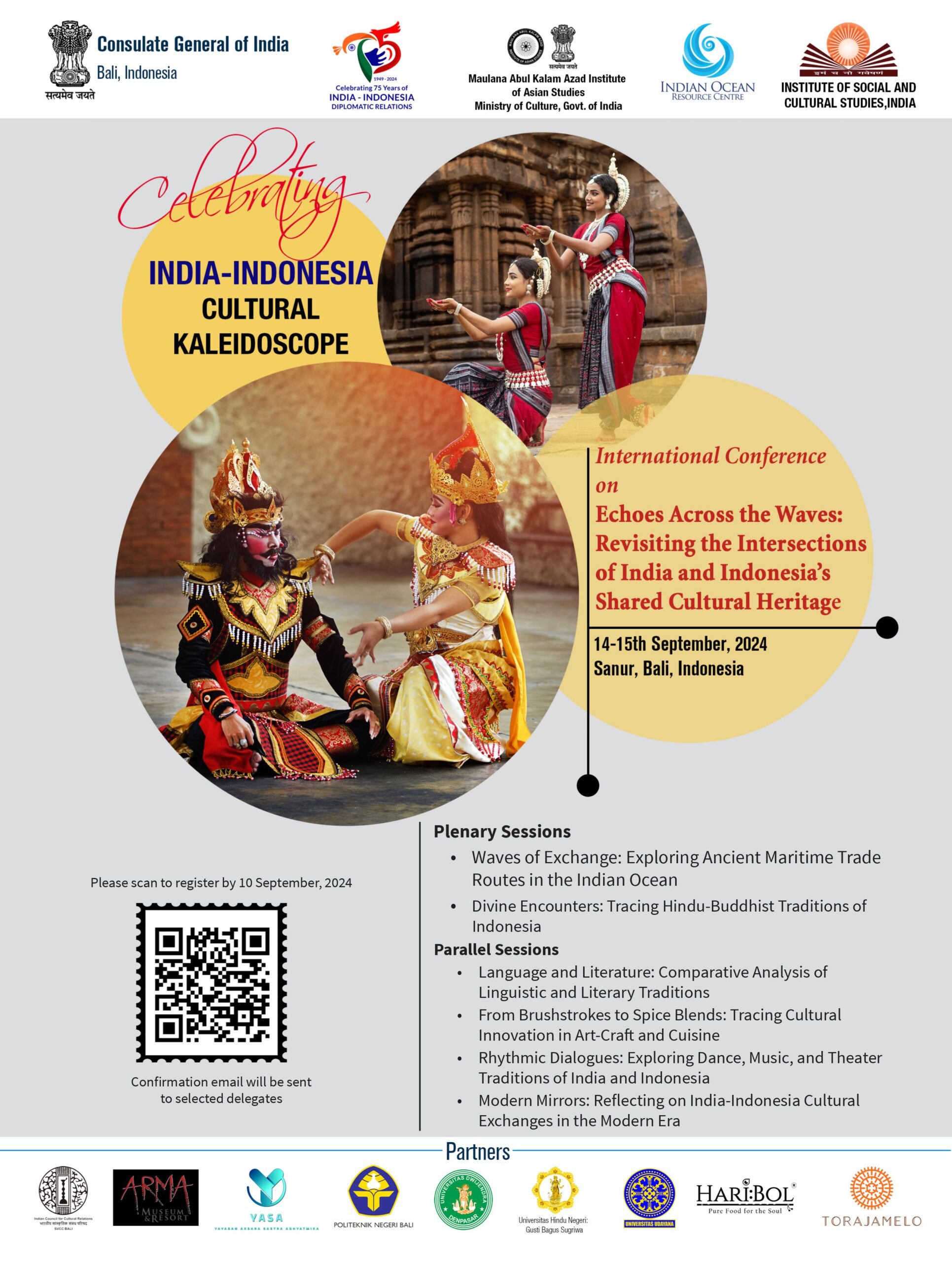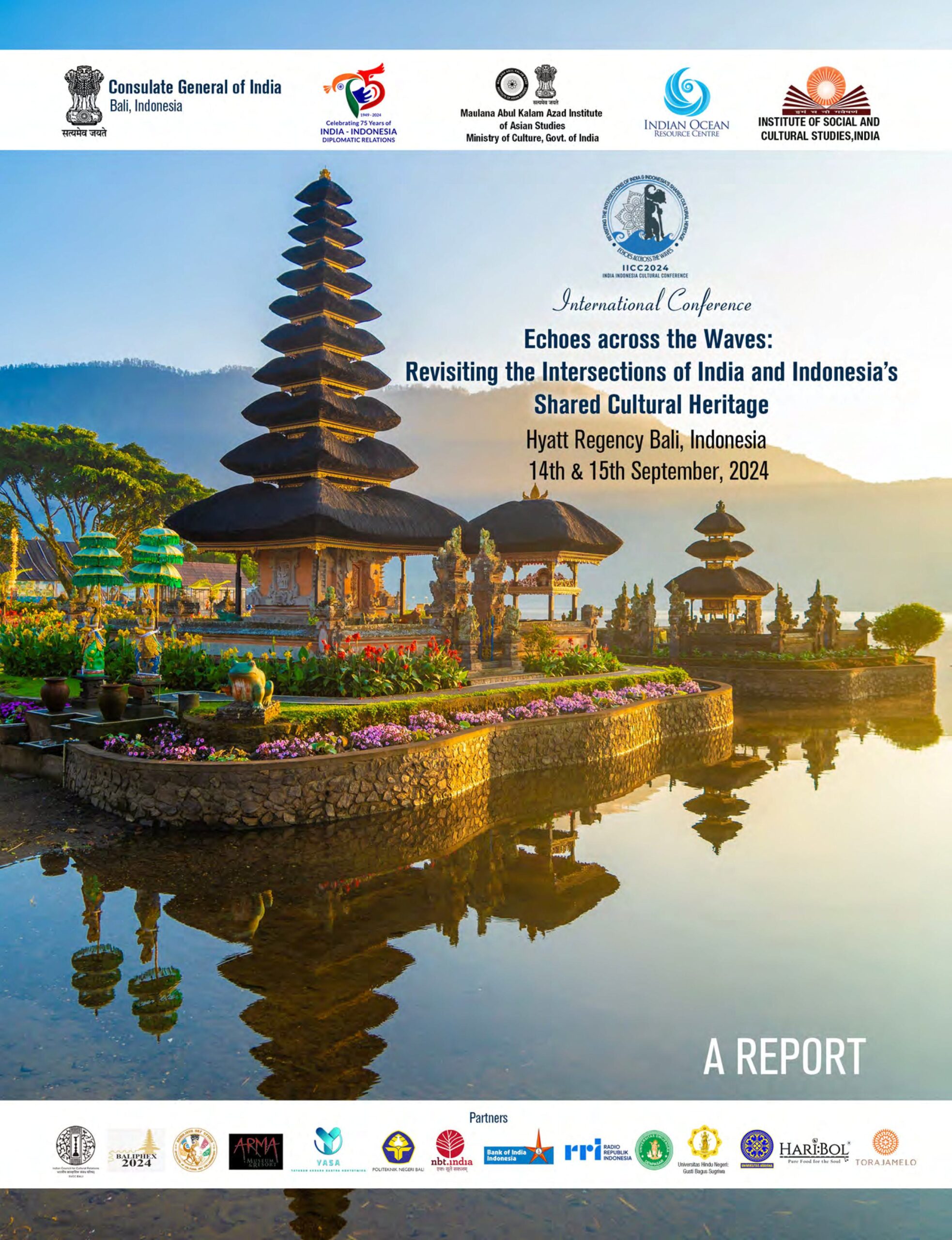Indian Ocean Resource Centre (IORC)
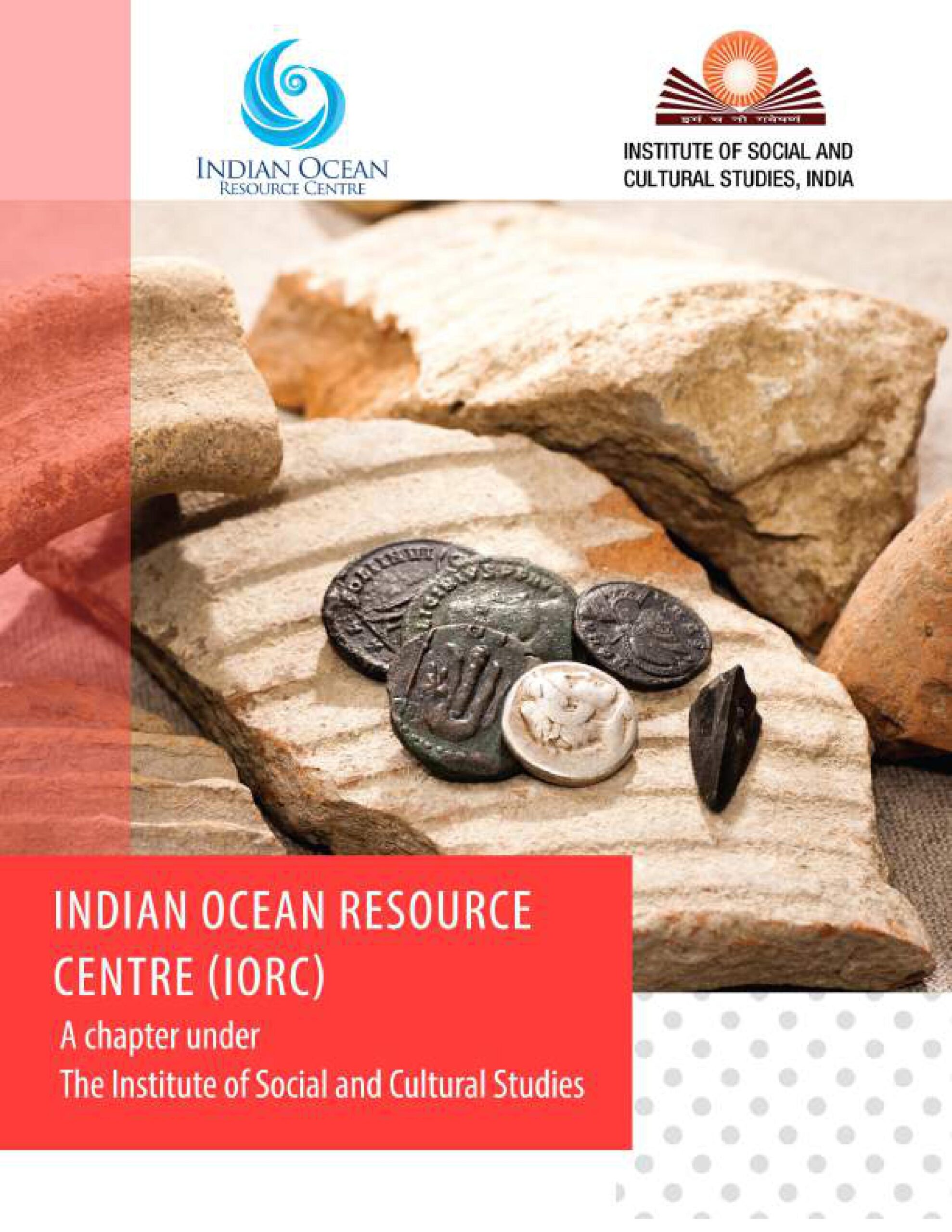
Indian Ocean Resource Centre (IORC)
The Institute through its multitude of initiatives and documentation have featured Indian Ocean Rim Countries over economy, security, civilization and cultural inter linkages. In order to work more intensely on Indian Ocean Rim related issues, the Institute in 2015 had developed Indian Ocean Resource Centre (IORC), which is conversing much efficiently about different genres of history, progressive views and ostensible diversities surrounding Indian Ocean.
Related Events
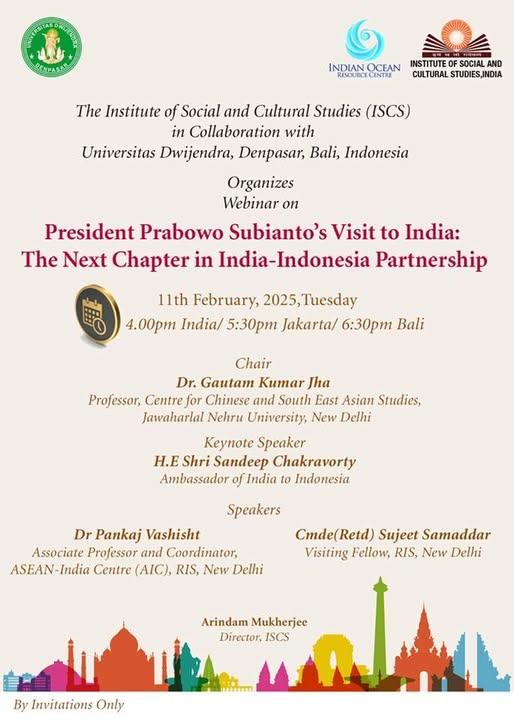
Webinar Report on President Prabowo Subianto’s Visit to India: The Next Chapter in India – Indonesia Partnership
Date: 11th February, 2025
Place:
Brochure
Webinar Report on President Prabowo Subianto’s Visit to India: The Next Chapter in India – Indonesia Partnership
Since ancient times, India and Indonesia shares deep socio-cultural, political and economic relations. Both the nations are old allies and India was the first major country to recognize Indonesia. The relation between India and Indonesia has grown in the last few decades. At present, Indonesia is one of the largest trading partners of India in the ASEAN region, with bilateral trade touching $29.4 billion in 2023-24. Both the counties also have robust diplomatic and military relations. In this context Indonesian President, Prabowo Subianto’sfirst state visit to India as the chief guest of India’s republic day celebration is regarded as an important milestone of India-Indonesia bilateral relations.
In this perspective the Institute of Social and Cultural Studies in collaboration with Universitas Dwijendra, Denpasar, Bali, Indonesia organized a webinar titled “President Prabowo Subianto’s Visit to India: The Next Chapter in India-Indonesia Partnership” on 11th February, 2025. Chaired by Dr. Gautam Kumar Jha, Professor, Centre for Chinese and South East Asian Studies, Jawarharlal Nehru University, New Delhi it had keynote speaker H.E. Shri Sandeep Chakravorty, Ambassador of India to Indonesia and speakers namely Dr. Pankaj Vashisht, Associate Professor and Coordinator, ASEAN-India Centre( AIC), RIS, New Delhi, Cmde(Retd.) Sujeet Samaddar, visiting fellow, RIS, New Delhi.
The programme got initiated with the introductory note of Professor Pradipto Roy, Associate Professor, Department of Political Science, Scottish Church College, who on behalf of ISCS welcomed the esteemed chair of the session and the distinguished speakers. In his brief deliberation, Professor Roy mentioned about the century old civilization linkages between India and Indonesia which had been nurtured through maritime trade, cultural exchanges, and various interactions. He further added that this bilateral relation between both the nations at present has now matured into a comprehensive strategic partnership covering a wide range of areas including defence, economic collaboration, maritime security, and cultural diplomacy. He concluded by stating that given Indonesia’s vital position in the Indo-Pacific region, President Prabowo’s visit has further solidified both the nations’ collective vision for regional stability, economic advancement, and strategic collaboration. He thereafter requested Dr. Gautam Jha to conduct the webinar.
Dr. Gautam Jha in his deliberation on the recent visit of the Indonesian President to India said that President Prabowo’s participation as a chief guest at the Republic Day celebration was more than just a ceremonial honour terming it as a testament to the deep rooted strategic, economic and cultural ties between these two great nations. In his speech, the speaker mentioned about the participation of 352 Indonesian armed force personnel in the Republic Day parade symbolizing the strength of both India and Indonesia’s defence and security partnership.
He stated that the current visit of the Indonesian President to India was a significant achievement which spread across multiple domains including political dialogue, defence and security, maritime cooperation, economic collaboration, digital transition, health, energy and cultural ties etc. He mentioned about the series of MOUs and agreements which were signed between both the nations which would ensure that the bilateral relationship would continue to expand in a structured and meaningful manner. At the end of his speech he mentioned how the webinar through meaningful discussion of the distinguished speakers aimed to explore the implications of the recently signed bilateral agreement,identifying new opportunities and strengthen the strategic visions for the next chapter of India-Indonesia relations. At the end of his disquisition he requested the key note speaker of the session H.E. Shri Sandeep Chakravorty to present his deliberation.
H.E. Shri Sandeep Chakravorty initiated his discussion by highlighting the symbolic significance of President Prabowo’s visit to New Delhi. He also highlighted the eagerness of the Indonesian president’s visit to India by mentioning that he had arrived in India one day before the schedule visit.
In his speech he spoke about the strategic partnership between both the nations. He mentioned how both nations elevated their strategic cooperation by signing the comprehensive strategic partnership during Prime Minister Modi’s visit to Indonesia during 2018. He thereafter highlighted the robust diplomatic relationship between both the countries by stating the the high level diplomatic visits which took place during the post covid period that included Prime Minister Narendra Modi’s visit to Bali in 2022, Jakarta in 2023, attending the ASEAN summit and Indonesian President’s visit to New Delhi in 2023.
He mentioned about the commonality between the Indian and Indonesian foreign policy and hoped that both the countries could work together in the international arena. He also mentioned about the possibility of cooperation between both New Delhi and Jakarta in building their domestic defence sector to shed their dependence on foreign nations for defence equipments. He also spoke how there would be more cooperation between both the countries in the field of health and pharmaceuticals. He also mentioned in his speech how President Prabowo was keen to draw investment from Indian private sector enterprises by meeting the leading Indian industrialists. In his deliberation the distinguished speaker also mentioned how Indonesia was keen to learn from India about the current social welfare schemes running in the country. He concluded his speech by saying that the robust bilateral relations between both the nations could be sustained if their representatives interact more frequently.
This meaningful deliberation was followed by the presentation of Commodore Sujeet Samaddar who focused his discussion on the strategic and defence cooperation between the two nations. He initiated his deliberation by mentioning the strategic significance of Indonesia. In the due course of his speech he mentioned about the history of defence cooperation between India and Indonesia that started long back in 1958. He mentioned about the International maritime agreement between the two nations in the year 1977, the bilateral defence agreement in 2021 and the coordinated maritime patrol that started since 2002. He thereafter mentioned how Indian Navy and Indian coast guard were the first responders to the Tsunami hit Indonesia in 2024. He said the navies, air force and armed forces of both the nations were engaged in exercises in form of Samudra Shakti, Garura Shakti and Tarang Shakti.
He also mentioned about the defence minister level dialogue between the two nations that last took place in 2022. He also spoke about the scope of sharing expertise in the field of defence technology. He also highlighted the significance of the initiatives like the India-Indonesia Joint Defence Cooperation Committee which aims to deepen cooperation in defence, industry, maritime security, and multilateral efforts, the ever “India-Indonesia Defence Industry Exhibition-cum-Seminar” organized in Jakarta on 30th April 2024 by Embassy of India, Ministry of Defense, Government of India and Ministry of Defence, Republic of Indonesia. In his deliberation he also mentioned about how both the nations were working in ensuring safety of navigation in the Indian ocean region and how both could collaborate with each other in hydrographic survey. In the course of his discussion he mentioned about India-Indonesia collaboration in building and designing unmanned arial vehicle, sea plane and water drones.
He mentioned about the several maritime agreements that were signed between the two countries which included the joint statement on Maritime Cooperation, 2016, shared vision on India-Indonesia maritime cooperation, 2018. The distinguished speaker in his speech mentioned how both the countries could work together in tackling anthropogenic problems like pollution, biodiversity loss and building maritime protected areas, identifying environmental protecting area, green shipping lines, managing fishing resources.
He concluded his speech by stating the importance of chalking out a effective framework by both the nations for building an effective bilateral relation between the two nations.
The last speaker of the session, Mr. Pankaj Vashist in his deliberation focused on the economic aspect of the India-Indonesia relations. He initiated his presentation by mentioning the historical diplomatic relation between the two nations. He said that the bilateral economic relation between the two nations had developed significantlyin the last seventy five years. He added that since the enactment of India’s Act east policy several bilateral mechanismshad been placed to strengthen the bilateral relations which included the regular meetings of ministers of trade of both the nations, CEO forum. He mentioned about more than three dozens of Indian big firms operating in Indonesia and the rising Indonesian investment in India. With the help of statistics he showed how bilateral trade between India and Indonesia had increased from 3 billion dollars in 2010 to 40 billion dollars at present. Besides this, he also spoke about the rising diversity in the bilateral trade between the two nations. However the speaker said that both the countries had still not reached their true bilateral trade potential and the main reason behind it remained the tariff and non-tariff barriers. In his speech he mentioned the achievement made by both the nations regarding trade facilitation and digital connectivity in terms of paperless trade. He said that both the countries would work together in ensuring an effective digital economy. He also mentioned about cooperation in the digital payment, fintech and critical mineral sector. He concluded his discussion by mentioning how increased mutual cooperation would ensure benefit for both the nations in future.
Following the deliberations of the speakers, the chair of the webinar opened the session for the participants where several comments and questions were asked to the speakers regarding the prospect of the India-Indonesia relations which were adequately replied.
The programme ended with the vote of thanks given by Ms. Kankana Roy on behalf of Institute of Social and Cultural Studies where she thanked the eminent speakers for their meaningful deliberations. He also thanked the august audience both from India and Indonesia for their participation in the seminar.
Collaborative Talk on “How Important is Indonesia in India’s economic development in the coming decade”
The Institute of Social and Cultural Studies(ISCS) in collaboration with The Maulana Abul Kalam Azad Institute of Asian Studies (MAKAIAS) organized a Talk on “How Important is Indonesia in India’s economic development in the coming decade” By Dr.Satish Chandra Mishra eminent economist and entrepreneur from Indonesia who had been, Managing Director of Strategic Asia & Director of Strategic Asia Global. The event was organized at The Indian Council for Cultural Relations, ICCR, Ministry of External Affairs, GOI.
The event initiated with a Welcome Address by Shri Arindam Mukherjee Director,ISCS India, followed to which the Distinguished Chairperson of the event Shri Ambarish Dasgupta- Senior Partner, Intueri Consulting LLP initiated his deliberation by mentioning the significance of understanding the geo- political risk that would emerge in 2024. He said beside the research scholars, the corporate sector is playing an important role in the analysis of the geo political risk. Initiating his discussion on Indonesia the speaker spoke about the cultural linkage between both New Delhi and Jakarta by mentioning the poem Sagarika and the letters of Bali Yatra written by Rabindranath Tagore while he was in Indonesia.
His deliberation was followed by the presentation of Dr. Satish Chandra Mishra who started his discourse by mentioning the cultural similarity between both India and Indonesia. He commented that India was central to the cultural imagination of Indonesia. He thereafter presented the systematic transition of Indonesia after 1999. He mentioned how decentralization of power, reform in the military had transformed Indonesia into a stable democracy. He thereafter discussed the economic success story of Indonesia. He said that Indonesia achieved highest economic growth rate despite facing challenges like economic crisis in mid nineties, 2008 and the devastating Tsunami. He spoke about the Bank restructuring programme of Indonesia, Universal national health insurance scheme of the country and how constitutional provision was made to spend 20 percent of the country’s budget in the education sector of the country.
In the last part of his deliberation he spoke on the sectors where both India and Indonesia could cooperate with each other and mentioned about sectors like maritime security, defense and infrastructure which included health, education, information technology related infrastructure along with traditional infrastructure.
The seminar ended with the thanks giving speech of Dr. Sarup Prasad Ghose who offered his sincere regards to the chair of the seminar Shri Ambarish Dasgupta and the speaker Dr. Satish Chandra Mishra. He also thanked the director of Institute of Social and cultural studies, Arindam Mukherjee for organizing such meaningful dialogue and also the participants who attended and raised important questions and suggestion over this topic
.
Echoes across the Waves: Revisiting the Intersections of India and Indonesia’s Shared Cultural Heritage
Introduction
In the vast expanse of the Indian Ocean lies a shared narrative of cultural exchange and historical resonance between two diverse yet deeply connected nations: India and Indonesia. Two day International Seminar on “Echoes across the Waves: Revisiting the Intersections of India and Indonesia’s Shared Cultural Heritage” encapsulates the essence of this enduring bond, inviting participants on a journey through time and space to explore the rich tapestry of cultural connections that unite these two nations. From ancient times, the Indian Ocean served as a conduit for trade, ideas, and cultural diffusion, facilitating the exchange of languages, philosophy, religions, art forms, and traditions between India and Indonesia.
This seminar endeavors to revisit and re-contextualise these intersections, shedding light on the profound impact they have had on the socio-cultural fabric of both countries From the intricate carvings of Borobudur to the vibrant color of Indian classical dance, from the philosophical teachings of the Bhagavad Gita to the mystical traditions of Javanese mysticism, our discussions will traverse the breadth and depth of India-Indonesia cultural connections. By revisiting these intersections, we aim to foster a deeper understanding and appreciation of the cultural bonds that unite us, while also laying the groundwork for future collaborations and initiatives aimed at preserving and promoting our shared heritage for generations to come. As we delve into the echoes of the past and contemplate their resonance in the present, this seminar aims to foster a deeper understanding and appreciation of the shared cultural heritage that binds India and Indonesia. Through collaboration, dialogue, and mutual exchange, we seek to not only celebrate the richness of our collective heritage but also pave the way for future collaborations and initiatives aimed at preserving and promoting our cultural legacy for generations to come.
Objective
The seminar aims to: Explore the historical, linguistic, religious, and artistic exchanges between India and Indonesia. Examine the contemporary manifestations and influences of shared cultural heritage in both countries. Foster dialogue and collaboration between scholars, researchers, artists, and practitioners from India, Indonesia, and beyond. Provide a platform for interdisciplinary discussions and perspectives on IndiaIndonesia cultural connections. Identify opportunities for further research, preservation, and promotion of shared cultural heritage.
DAY 1
Inaugural Session
Welcoming Remarks and Keynote Address
DAY 2
Plenary Session I
Topic: Waves of Exchange: Exploring Ancient Maritime Trade Routes in the Indian Ocean
Time: 10.00 a.m. – 11.15 a.m.
These session here would focus on the ancient maritime trade routes that crisscrossed the vast expanse of the Indian Ocean serve as a testament to the rich tapestry of trade and cultural exchange between nations. Among the myriad interactions along these routes, the connections between India and Indonesia stand out for their depth and significance. From as early as the first millennium BCE, merchants and seafarers traversed these waters, carrying goods, ideas, and cultural practices between the shores of the Indian subcontinent and the Indonesian archipelago. Spices, textiles, precious metals, and gemstones flowed from the ports of India to the bustling markets of Indonesia, while languages, religions, and artistic traditions were exchanged and assimilated along the way. The maritime trade between India and Indonesia not only facilitated economic prosperity but also fostered a profound cultural syncretism that continues to shape the identities of both nations to this day. Through the exploration of these ancient maritime trade routes, we gain insight into the interconnectedness of India and Indonesia, and the enduring legacy of their shared cultural heritage.
Parallel Sessions I
Topic A :Language and Literature: Comparative Analysis of Linguistic and Literary Traditions
Time: 11.15 a.m. – 12.30 p.m.
Time: 11.15 a.m. – 12.30 p.m.
This session offers a platform for scholars and enthusiasts to delve into the linguistic and literary connections that have flourished between India and Indonesia over centuries. Through a comparative lens and explore into the rich tapestry of literary traditions encompassing epics, poetry, and philosophical texts. By tracing the evolution of languages and literature across borders, this session sheds light on the shared narratives, cultural exchanges, and enduring influences that have shaped the literary landscapes of both nations, fostering a deepe understanding and appreciation of their shared cultural heritage. Sanskrit, an ancient Indian language, has influenced Indonesian languages, especially in terms of vocabulary. Both countries have cultural terms and expressions rooted in Sanskrit. The Ramayana and Mahabharata, ancient Indian epics, have influenced Indonesian art, literature, and performance arts. Indonesian shadow puppetry (wayang kulit) often features stories from these epics.
Lunch
Time: 2.00 p.m.- 3.00 p.m
Parallel Session II
Topic A: Rhythmic Dialogues: Exploring Dance, Music, and Theater Traditions of India and Indonesia
Time: 3.00 p.m.- 4.15 p.m.
We delve into the rich tapestry of dance, music, and theater traditions that bind India and Indonesia together. This session offers a captivating exploration of the rhythmic dialogues and harmonic melodies that have echoed across borders, transcending time and geography. From the intricate footwork of Indian classical dance forms like Bharatanatyam and Odissi to the graceful movements of Indonesian dances such as Javanese and Balinese, we uncover the nuanced expressions of cultural identity and storytelling embedded within these art forms. Through vibrant performances and scholarly discussions, participants will gain insight into the cultural cadences and artistic interplay that have flourished between these two nations, illuminating the enduring legacy of their shared cultural heritage.
Lunch Time: 2.00 p.m.- 3.00 p.m.
Topic B:Modern Mirrors: Reflecting on India-Indonesia Cultural Exchanges in the Modern Era
In this session, participants will engage in a thought-provoking exploration of the contemporary cultural exchanges between India and Indonesia, observing how these interactions reflect and shape the cultural landscapes of both nations in the modern age. From the realms of art, literature, and cuisine to the realms of technology, business, and diplomacy, this session delves into the multifaceted dimensions of cultural exchange, tracing the threads of connectivity and collaboration that bind India and Indonesia together in today’s globalized world. Through insightful discussions and reflections, participants gain a deeper understanding of the evolving dynamics of cultural exchange between these two vibrant nations, uncovering new pathways for mutual understanding, appreciation, and collaboration in the 21st century.
The presence of Indian films and Bollywood music has gained popularity in Indonesia, reflecting contemporary cultural exchanges. Cultural festivals and events celebrate the diversity and shared heritage of the two nations. Bilateral agreements and cultural exchange programs foster closer ties between India and Indonesia. People-to-people interactions through tourism, academic exchanges, and business collaborations contribute to cultural understanding. Both countries actively participate in international forums and organizations, promoting their cultural heritage and strengthening global partnerships. Overall, the cultural connectivity between India and Indonesia is deeply rooted in history and continues to evolve through various forms of exchange, creating a strong foundation for bilateral relations. There is an active cultural exchange between the two countries. The consulates of India operate Jawaharlal Nehru Indian Cultural Centre (JNICC) which holds regular classes of Indian classical music, Indian classical dances, Yoga, and also teaches Indian languages. Yoga is now popular among youths in Indonesia. Valedictory Session Reflections on Shared Heritage and Future Collaborations.
Valedictory Session
Reflections on Shared Heritage and Future Collaborations
Time: 4.30 p.m.- 5.30 p.m.
‘Echoes across the waves’ seek to foster a deeper understanding and appreciation of the enduring cultural ties between India and Indonesia. By revisiting historical intersections and exploring contemporary expressions, the seminar aims to contribute to the preservation and promotion of this shared cultural heritage for future generations.



